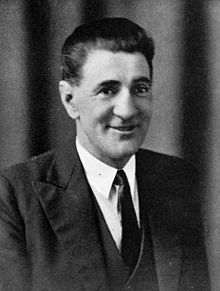John A. Lee
|
John A. Lee DCM |
|
|---|---|
 |
|
| Member of the New Zealand Parliament for Grey Lynn |
|
|
In office 1931–1943 |
|
| Preceded by | John Fletcher |
| Succeeded by | Fred Hackett |
| Member of the New Zealand Parliament for Auckland East |
|
|
In office 1922–1928 |
|
| Preceded by | Clutha Mackenzie |
| Succeeded by | James Donald |
| Personal details | |
| Born |
31 October 1891 Dunedin, New Zealand |
| Died | 13 June 1982 (aged 90) Auckland, New Zealand |
| Political party |
Democratic Labour Party (1940–49) Labour Party (1919–40) |
| Spouse(s) | Mollie Lee |
| Awards | Distinguished Conduct Medal |
| Military service | |
| Allegiance | New Zealand Army |
| Years of service | 1916-18 |
| Rank |
|
| Battles/wars | World War I |
John Alfred Alexander Lee DCM (31 October 1891 – 13 June 1982) was a New Zealand politician and writer. He is one of the more prominent avowed socialists in New Zealand's political history.
Lee was born in Dunedin in 1891, the son of Alfred Lee and Mary Isabella Taylor. His parents were not married, and at the time of his birth, they had already separated due to his father's gambling and alcoholism. Lee's mother had little income, and the family experienced considerable financial hardship. Lee did not do well at school, and he was often truant.
In 1905, he left school to work, and became involved in petty crime. In 1908, he was convicted of theft, and served time at a boarding school for juvenile delinquents. He attempted to escape several times, and was eventually successful. After wandering the country for a time, he found work in Raetihi, but was then jailed for liquor smuggling and breaking and entering.
Three years after being released, Lee enlisted in the New Zealand Expeditionary Force, and served in World War I. He was awarded the Distinguished Conduct Medal for action at Messines in June 1917, but was repatriated after being wounded in March 1918 and losing his left arm. He arrived back in New Zealand in July 1919, and established a small business.
Not long after returning home, Lee became active in the Labour Party. Lee had been a committed socialist for some time, having read a large amount of Marxist literature over the years. He is said to have heard the speeches of Bob Semple and Harry Scott Bennett through the bars of his jail cell, and in the army, he had been known as "Bolshie Lee" for his views. Lee's status as a veteran was considered valuable by the Labour Party, as the party's anti-conscription stance had caused many to brand it unpatriotic — Lee, a decorated and wounded soldier, was able to counter this perception quite effectively. By 1920, Lee was on the Labour Party's national executive.
...
Wikipedia
